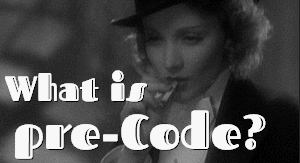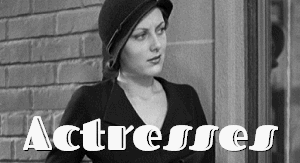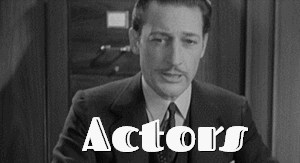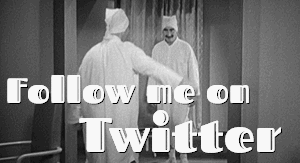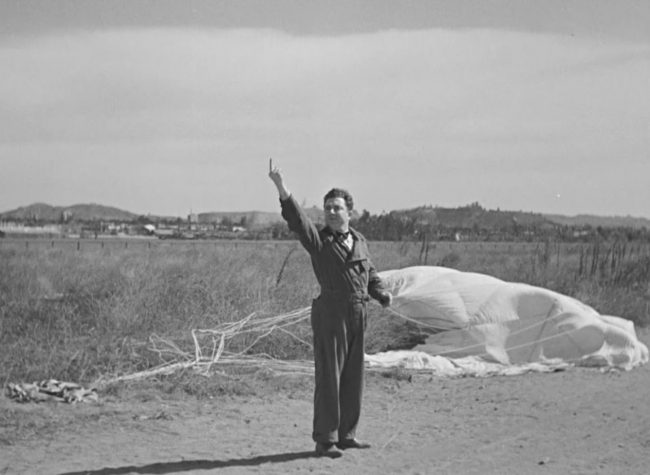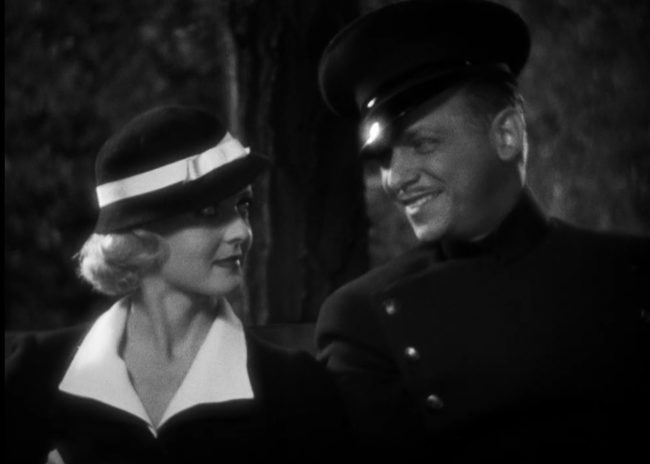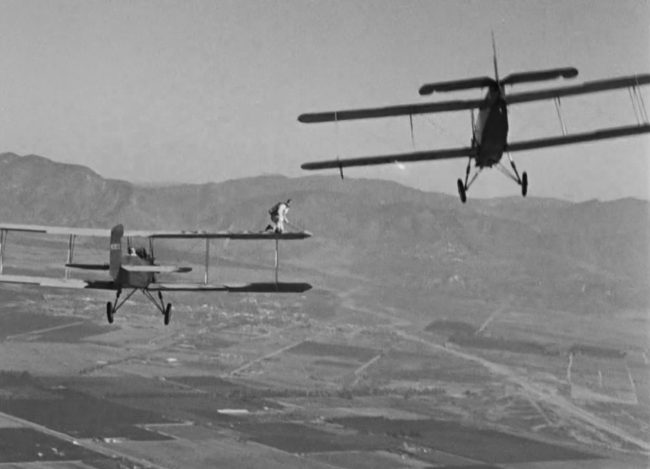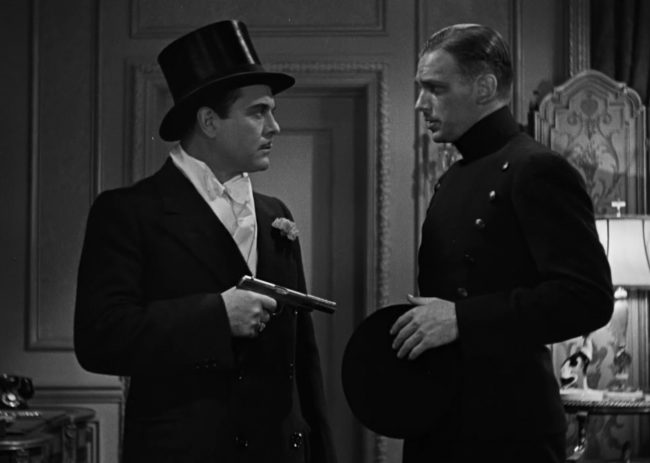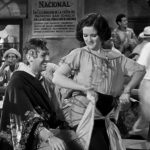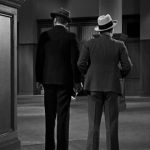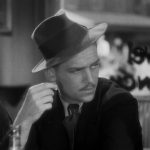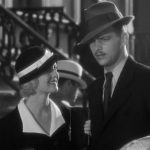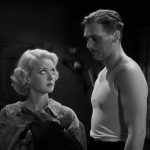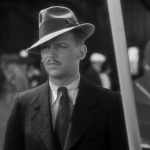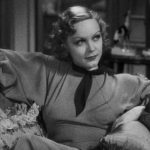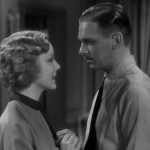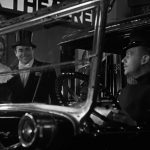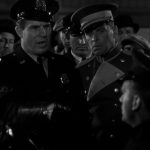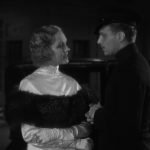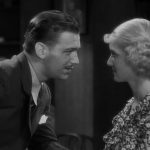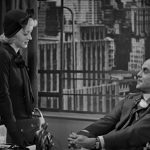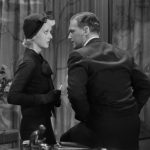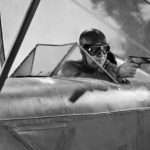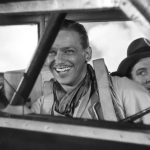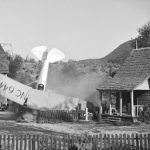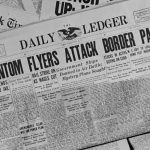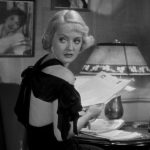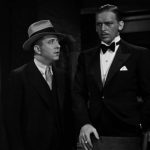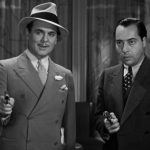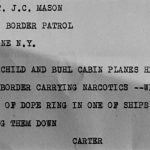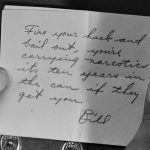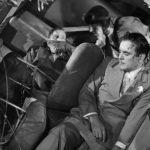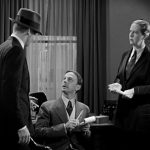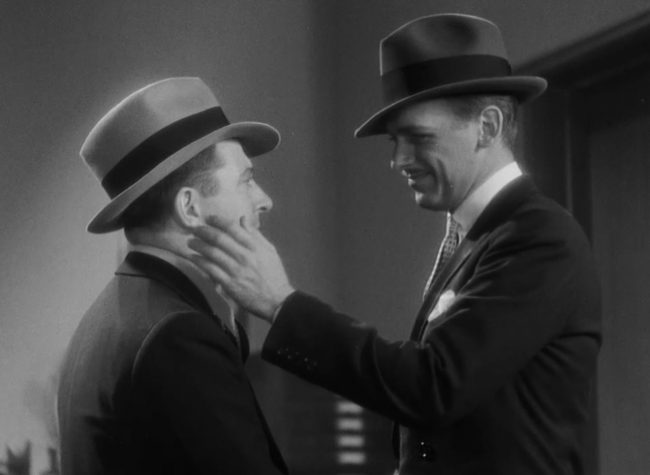
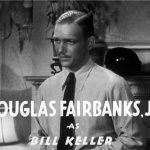 |
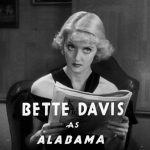 |
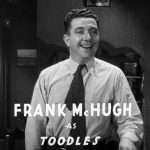 |
| Bill Douglas Fairbanks Jr. |
Patricia ‘Alabama’ Brent Bette Davis |
Toodles Frank McHugh |
| Released by Warner Bros./First National Directed by Alfred E. Green Run time: 72 minutes |
||
Proof That It’s a Pre-Code Film
- Opens with a full frame shot of a woman shaking her can.
- Something you don’t hear often in those days: the sound of a toilet flushing.
- Fairbanks and McHugh mimic fey accents a few times in the picture.
- Bill sneaks in to try and molest a sleeping Alabama. She forgives him after he promises, “It’s not going to happen again. At least while I’m sober.”
- Bill has a discussion with Mrs. Newbury (Claire Dodd) that is laced with euphemisms. He also has to remove his shirt and turn around to get a good look at his physique. She goes on to seduce Bill as he needs “I suppose there will be considerable night work.” She adds, “All of my chauffeurs have been Frenchmen. I think as a rule they’re more versatile.”
- Kurt Weber (Leo Carillo) is a gangster whose sideline is bootlegging, but makes most of his money smuggling cocaine across the Canadian border.
- Bill catches Alabama acting flirtatious with Weber and gets jealous. Alabama defends herself, “A girl’s got to kid her way along to get a job nowadays!”
- The old “make a guy look like he’s reaching for his gun so you can kill him and claim self-defense” gag.
- Frank McHugh offers a well-known salute when someone doesn’t pick him up from the side of the road.
Parachute Jumper: Turbulent
“Do you object to cracking– I should say, bending the law a little here and there?”
“What law?”
“Heh. The one we all laugh at.”
Flippant and carefree for a film that concerns drug smuggling, starvation, and murder, Parachute Jumper is a typical Warner Bros. pre-Code picture– fun, reassuring, and jaw-dropping. The quality of the cast and light tone make this one of the more enjoyable jaunts of the time, with something for everyone, whether you like gaping at Douglas Fairbanks Jr. in ravishing suits or… well, who else is there?
After getting unceremoniously drummed out of the Marine Air Corps, Bill (Fairbanks) and Toodles (Frank McHugh) spend months out of work. Out of work stenographer ‘Alabama’ Brent (Bette Davis) tries to pick up Bill, and he feels sorry for her, offering to let her share his ramshackle apartment. The two bond by stealing a bottle of catsup and a bowl of sugar from a diner as well as a fish from a cat (“You wouldn’t eat a cat, would you? Not raw, anyway.”) .
Bill finally makes good when he stumbles onto a parachuting exhibition at a local airfield. As if the midair jumps weren’t exciting enough, we’re also treated to him crash landing in front of a moving train. Through a number of improbable events, Bill finally ends up as the bodyguard for bootlegger Kurt Weber, with Alabama getting a job as his secretary. Bill’s job includes picking up drug running duties with Toodles across the border. Unsurprisingly, this goes south, with Bill having to use his quick wits not to get shot down by the feds.
Parachute Jumper is one of the above-the-board kind of Warner Bros. programmers of the time, a kind of a fun, immoral jaunt. It’s concerned mostly with wisecracks and winking at the audience. The Depression eats away at all three of our main trio, but they persevere with wit. The film’s high-flying stunts, no doubt drawing from the massive success of Hell’s Angels and its ilk over the preceding years, have some gee-whiz stuff, including transfers between planes and other acrobatics.
The drug running plot is also amusing, as it would be scarcely possible to believe you’d watch a movie about a pair of drug smugglers who get off with an upbeat, happy ending even 90 years after this movie was made.
Douglas Fairbanks Jr., who I think was at the height of his charms in the early 30s, handily carries this picture as a headstrong pilot who has an empty stomach, big heart, and a sexual drive that takes a little more control than usual in these films. Frank McHugh has his usual bumbling joker, though he has a nice bit of heart and an easy friendship with Fairbanks. Bette Davis, saddled here with a near-unforgivable Southern accent, is still very early in her career, and that’s all we’ll say about that. Claire Dodd has some nice work as a maneater, and Leo Carillo’s bootlegger comes closer to the manager of a rundown Chuck E. Cheese than Edward G. Robinson, but what are you gonna do.
The thing I liked about Parachute Jumper that I don’t think I appreciated on my first go-around was how the film never let’s you get comfortable with what’s happening. Fairbanks goes through four different jobs in the picture, thus saving it from ever being predictable. When the finale comes where Fairbanks outwits Carillo, crash lands his plane and escapes scott free, it all fits in magnificently because the film establishes his wits and daring through each of his successive careers. (Though the film’s final shot, with Fairbanks hurriedly proposing to Davis, comes across a bit clunky.)
Parachute Jumper is a fun, breezy 72 minutes, and a good example at some of the things that pre-Code cinema excelled out, outside the not-so-great part Alabama is forced to play. It’s not essential, but it’s a good time.
Screen Capture Gallery
Click to enlarge and browse. Please feel free to reuse with credit!
Other Reviews, Trivia, and Links
- TCMDB has a nice, long piece on this from Jay Carr, with much about Bette Davis’ career.
Of her 94 films, Parachute Jumper (1933) held a special place in Bette Davis’s heart. Dead last. Perhaps Davis had some input when Robert Aldrich, filming What Ever Happened to Baby Jane? (1962), chose two clips to illustrate why Baby Jane Hudson’s career tanked and one of them came from Parachute Jumper (the other came from Ex-Lady, released the same year). […]
These people get knocked down, but don’t stay down, and this was the message they transmitted to Americans week after week at the movies. In his lesser way, McHugh’s character projects the same self-reliance (in an era of great screen tough guys, however, Carrillo just doesn’t project enough menace). […] We’re never far from the bleak realities of joblessness and homelessness (sound familiar?). Discovering he’s been used as a drug-runner turns Fairbanks’s Bill against a life of crime. Bootlegging, which most of America laughed at during Prohibition, didn’t.
- Stacia at She Blogged by Night finds this one enjoyable, saying, “This film is a lot of fun, and if you like your pre-Codes grungy and funny, you’ll like Parachute Jumper.“
- Mordaunt Hall for the New York Times said in his contemporaneous review:
[Parachute Jumper] is, “a fast-moving tale of adventure in the air and on earth, and although it has some unnecessarily coarse scenes it is for the most part a racy affair, with glimpses of airplane crashes and others depicting men leaping from flying machines with parachutes.”
- The review above is an updated one I wrote in December 2019. What follows is my “Indifferent” May 2011 review from when I was much younger, not quite as knowledgeable and… okay, I couldn’t make myself reread it. Hopefully it doesn’t suck.
Seeing as how I’m about 25 films into my series about Pre-Code Hollywood, I decided, at long last, to actually sit down and read the Hayes Code of 1930 which laid out the moral guidelines that films were supposed to follow. They finally started following them in 1935 when all scripts became required to get the Code’s approval before being filmed, which hampered severely Hollywood’s previous reaction to the Code which was, “It’s better to ask for forgiveness than to ask permission. And even then, you really only need to ask for forgiveness if the film flops.”
Parsing through the code, it’s interesting to see not only the stuff I knew would be in there (people who break the law aren’t allowed to get away with it, no adultery, etc), but also the stuff I hadn’t even considered. The end features a gag where our comedic sidekick throws up his thumb to try and get a ride– the car passes him by, and that thumb morphs into a middle finger. Could you do this two years later? Nope. That gesture was forcibly removed from the cinematic lexicon for two decades.
The Code would later declare a lot of Parachute Jumper off limits, and for more than just one extended appendage. The story of two men who are thrown out of the Marines after one airplane crash that landed them in a South American brothel, they both find things going from bad to worse as the Depression kicks in.
Of the two pals, Douglas Fairbanks Jr. is the romantic lead and a veritable low-rent Clark Gable, the guy who wears a big moustache back when it was still cool. Frank McHugh is his sidekick and his character’s name is “Toodles”; if the fact that you’re portly doesn’t illustrate where you are in the screenplay hierarchy, then that name certainly does.

Fairbanks Jr. is Bill, who, despite sharing his only nice suit with Toodles day in and day out, still manages to hook up with a good looking Southern girl named Patricia. Patricia is played by Bette Davis. I love Bette Davis– give me some Now Voyager any day of the week and I’m a happy camper– but it pains me to say it: Better Davis is awful in this film. Saddled with a terrible accent and given the rather clunky nickname of ‘Alabama’ to boot, Davis practically holds her character at arm’s length. I can’t say I blame her– it’s not much of a character anyway.
She mostly serves to ogle at Bill’s acts of courage and stupidity. He’s the titular parachute jumper, though he only parachute jumps once (1 time) in the entire film. This gets him enough money to get into the employ of a smuggler, who hires him and Toodles to fly across the Canadian border to pick up some still-illicit booze as well as a few other mysterious packages.
It’s rare you see a film from the 30’s deal with any substance other than booze (and even more rare that you see any of them treating Prohibition with an ounce of respect), so Parachute Jumper taking Fairbanks Jr. into the ‘dope’ trade surprised me. The only function of it is to up the stakes: everyone is okay with transporting alcohol, but a small amount of dope? Now it’s time to punch men with smaller, blacker mustaches in the face!

The moral indignity that the film traffics in for dope smuggling compared to the way it handles booze smuggling, sexual harassment, seduction, murder, and even the middle finger is quite interesting. Peeking through these old films isn’t just a way to find some fun, obscure movies, it’s fascinating to see how the American film industry has depicted American values. Because while our heroes are adulterers, bootleggers, and petty thieves, they will not deal drugs.
Parachute Jumper itself is rarely interesting outside of the morals it displays, and some of the acting– Bette, I’m looking at you– is beyond clunky. This is getting tossed into the ‘more fun to dissect than watch’ pile with Call Me Savage, and fits into the old Hollywood mold of throwing a lot of stuff at the screen to see what sticks. Nothing does.
Awards, Accolades & Availability
More Pre-Code to Explore
